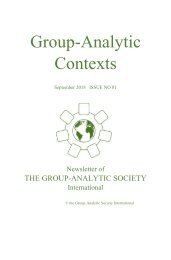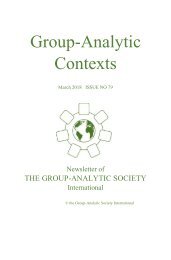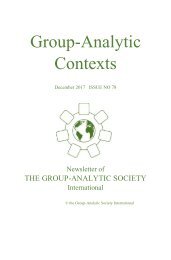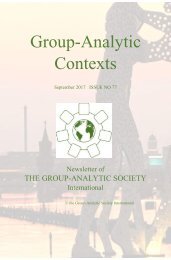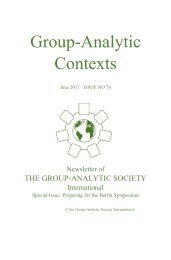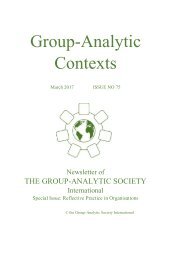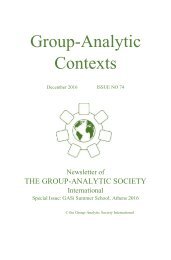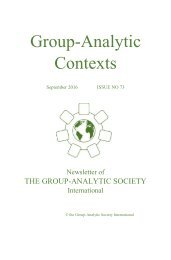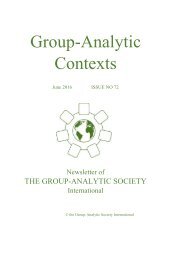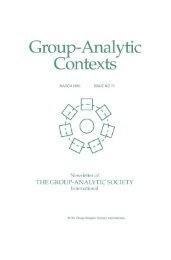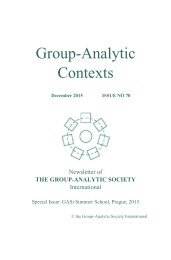Group-Analytic Contexts, Issue 80, June 2018
You also want an ePaper? Increase the reach of your titles
YUMPU automatically turns print PDFs into web optimized ePapers that Google loves.
Newsletter – Summer <strong>2018</strong> 79<br />
questions concerning the nature of resilience lingered in her mind. But<br />
how much therapy would it take?<br />
Did infantile disappointments still influence her selections -<br />
despite justifications which she could easily produce if she was<br />
questioned? Or, had she refused to conduct this group because she was<br />
disappointed that the Visitors’ had seemed to understand her<br />
philosophy but not her practice – at a time when her profession was<br />
already beleaguered? Her disappointment was irrational; the Visitors<br />
didn’t overtly support anyone; but it was unusual for successful<br />
professionals to be under as much scrutiny as more problematic<br />
individuals.<br />
She revisited familiar scripts. Boundaries protected<br />
vulnerable people. Agreement about the rules helped participants feel<br />
safe. The therapist had made clear that, in her profession, boundaries<br />
were necessary – both within and around the group. Too much damage<br />
had been done when they became blurred. Boundary violations were<br />
understood in relation to such concepts as omnipotence, abuse, acting<br />
out, power differentials and familial re-enactments. The Visitors had<br />
asked how often these concepts became vents for disapproval and<br />
curtailed conversation - rather than exploring interactions in all their<br />
complexity.<br />
She worried that engaging with the Visitors questions<br />
concerning historical and cultural variations, or the unique trajectories<br />
of the evolution of individuals - whether in relation to greed, sex or<br />
violence - risked colluding with self-gratifying rationalizations. It was<br />
inevitable that professional boundaries excluded unacceptable<br />
behaviour, unwanted experience and extremes of all kinds, even if the<br />
unwanted then remained located in current social receptacles for<br />
badness and madness. She had felt her shoulders tense and her<br />
boundaries sharpen during these enquiries.<br />
When the Visitors were more active, they seemed to<br />
notice each time this happened and respond to the line of her shoulders<br />
rather than to her words. They had asked about the derivations of<br />
words like: boundary, inclusion, exclusion, impingement,<br />
infringement and transgression – asking questions which left the<br />
communicants thinking more about their own derivations – about the<br />
link between the mind that expressed with the expression chosen.<br />
They enquired how ‘bound’ [which also meant ‘to tie tightly’] had<br />
become, in ‘boundary’, used to denote exclusion. They became<br />
puzzled that the evolution of words no longer appeared part of<br />
everyday thinking - as if current usage was meaningful without<br />
historical perspective.



